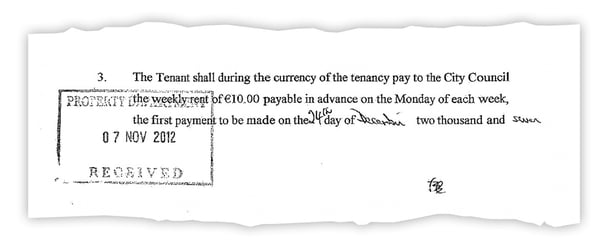Local Authority: Cork City Council
Issue: Property management
Property management is one of many day-to-day functions councils are tasked with.
But, as audits from the Local Government Audit Service make clear, councils are sometimes guilty of mismanaging their property portfolio, which invariably results in a loss to the taxpayer.
Cork City Council provides one such example, contained in the 2015 audit report.
The auditor noted that the council rented out a building for a nominal sum for use as a medical practice.
This was initially supposed to be a temporary arrangement that began in December 2007, but remained in place until 2016, costing the taxpayer thousands in lost revenue.
RTÉ Investigates obtained additional records relating to this building through requests made under the Freedom of Information Act.
In January 2008, a temporary licence agreement was put in place, in which the tenant would pay a weekly rent of just €10 per week, which was retrospectively applied from December 2007.
The council told RTÉ Investigates that this arrangement was "to enable the tenant to occupy the premises, pending a longer-term lease being agreed".

It also said that either party could terminate this licence with one week's notice under this arrangement.
But the temporary arrangement remained in place for several years.
In 2012, the council commissioned a valuation of the property, which estimated that it had a market-rate rent of up to €35,000 per year. It wrote to the tenant’s solicitor that year with a proposal for a new lease for this amount, which would be charged retrospectively from the date of occupation by the tenant. However, this proposal was not accepted by the tenant.
The matter dragged on and, in March 2015, the council’s law agent wrote to the tenant’s solicitor, proposing a new three-year term of €27,500 rent per year. The following month, the tenant’s solicitor confirmed that this would be acceptable.
That was not the end of the issue. Correspondence in 2016 shows a back-and-forth between the two parties. The council’s law agent stated that the new rent payment would be backdated to January 2016, which was not accepted by the tenant’s solicitor, who said that this should be payable once the lease agreement was completed.
The solicitor complained about delays in getting a response from the council, stating in February 2016 that it had taken the council "approximately 10 months to clarify the straightforward terms of the Lease". That October, the solicitor told the council that "Our client has waited for many years for the Council to get its act together in respect of a proper Lease Agreement".
The following month, the council’s law agent conceded that the new rent would be charged from November. The new lease agreement was finally completed at the end of that month.
Had the council charged a rent of €27,500 per year from December 2007 to November 2016, it would have earned around €245,000 for the public purse. Instead, by charging €10 per week over nine years, it received around €4,500.
A similar story unfolded at a building adjacent to the medical practice, occupied by a financial institution.
The council had also entered a temporary letting arrangement, which began in December 2007 for a nominal sum of €10 per week, but remained in place for several years.
The council later agreed to sell the premises to the financial institution. Remarkably, during the sale process, it emerged that the tenant had not even been paid the nominal weekly rent.
In March 2017, the council’s law agent wrote to the financial institution’s solicitor to say that the council had "no record of receipt of rent from your client for the period of your client’s occupancy to date".
The letter also requested that the outstanding rents be paid before the sale would be completed.
The tenant’s solicitor initially claimed that "It is unfair to charge all the rent given the length it took to finalise matters and get City Council approval to finalise the Lease".
The letter also said that the tenant would agree to pay 50% of the outstanding rents, but the council did not accept this.
Ultimately, the financial institution later paid €4,860, the amount owed in rent – a fraction of what the council could have earned had it charged the market rate – and the property was then sold to the tenant for €283,000.









